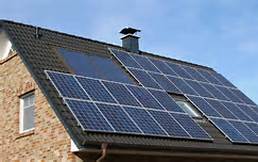 As alternative energy sources like solar become more affordable it is only natural that people will want to use them as a way to both save money and be environmentally friendly. This is particularly true for solar power in western regions like the Grand Canyon state of Arizona that see a large amount of sunshine over the course of the year. This presents a problem to utility companies who derive their revenue from the monthly fee that customers pay to get their electrical services.
As alternative energy sources like solar become more affordable it is only natural that people will want to use them as a way to both save money and be environmentally friendly. This is particularly true for solar power in western regions like the Grand Canyon state of Arizona that see a large amount of sunshine over the course of the year. This presents a problem to utility companies who derive their revenue from the monthly fee that customers pay to get their electrical services.
Customers who install rooftop solar panels reduce the amount of their monthly fee by a large amount both in limiting the amount of electricity they use but also in selling power during sunshine hours, when they are using nothing from the power plants, while others are at peak demand. They only use power when there is no sunshine and then at a reduced rate.
The reason this is a problem for utility companies is because the fees they charge for their electricity include upkeep on their vast distribution network. This includes the installation of power lines and poles as well as the constant upkeep on those items. Those who use solar panels are both receiving and sending electricity through this infrastructure.
In Arizona there was a proposal by the utility companies to charge anyone who put solar panels on their roof up to $100 a month in excess of their normal bill. The rational being that solar producers reduce their monthly rates by about $100. This fee would cover the difference so that solar panel owners would pay their share of the upkeep and maintenance of the infrastructure. The real reason for the massive fee is, of course, to discourage people from purchasing solar panels and keep them dependent on the power companies.
The power companies spent $4 million on a campaign to convince people the fee was justified. The argument being that if there was no fee that the companies would have to charge more in general to cover the revenue gap. The regulatory committee decided on a $5 a month surcharge to anyone with solar panels.
In my opinion the utility companies are acting disingenuously. The reality is that solar power is becoming increasingly economically affordable without any subsidies. As this happens more and more people will install such panels. Batteries are becoming more sophisticated so that such people will be able to store energy accumulated during the day and rely even less on utility companies.
Those who get solar panels and reduce their costs should not be punished for such a move. Power companies that try to disrupt the future of solar energy are fighting a losing battle. They must recognize this coming trend and adjust their business model rather than trying to regulate competition out of business. One suggestion in the comments that made sense to me was to break the bill into sections for actual electricity use and infrastructure. Everyone would pay the infrastructure portion of the bill equally but payment for use would be based on … use.
This attempt to disrupt natural capitalistic processes via regulations stands against everything for which a libertarian stands. Let the market dictate. If solar becomes viable then it will produce its own economic winners in an organic fashion. If it is not viable, then it will not.
Tom Liberman
Sword and Sorcery fantasy with a Libertarian Ideology
Current Release: The Spear of the Hunt
Next Release: The Broken Throne
 A fellow by the name of John Gallagher invited me to be on his podcast to talk about energy freedom and I just finished up. It was an interesting discussion.
A fellow by the name of John Gallagher invited me to be on his podcast to talk about energy freedom and I just finished up. It was an interesting discussion.